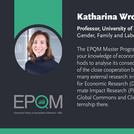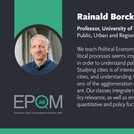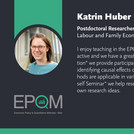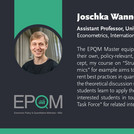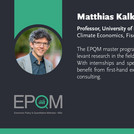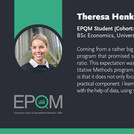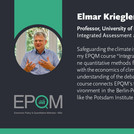Economic Policy and Quantitative Methods (EPQM) | Master
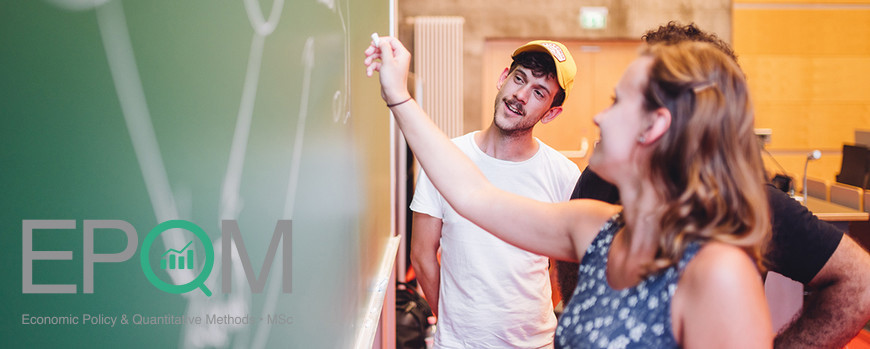
The four-semester master's degree program in Economic Policy and Quantitative Methods (EPQM) is an excellent preparation for those seeking evidence-based answers to today's pressing challenges such as growing inequality, continuing globalization, and climate change. The program combines theoretical foundations with a strong focus on application and covers the two core areas of economic policy and quantitative methods. Based on a strong theoretical foundation, the program has two focus areas: one in economic policy and one in quantitative methods. You will acquire the skills to understand economic policy and to analyze it empirically using modern data analysis software (e.g. STATA, R, Matlab). You will benefit from the excellent student/teacher ratio in the academic department, profound exchanges with external research institutions (DIW Berlin, PIK, MCC), and the opportunities offered by an accompanying internship program run by the Center for Economic Policy Analysis (CEPA). A wide selection of modules for more in-depth study such as Climate Policy, Gender Economics, or Machine Learning offer you many different specialization options. You can also gain valuable international experience as a student through the double degree program with the Université Rennes or by spending a semester abroad at one of the excellent partner universities.
| Name | Economic Policy and Quantitative Methods (EPQM) |
| Degree | Master of Science (possibility of a double degree in cooperation with the Université Rennes) |
| Standard period of study | 4 semesters |
| Credit points | 120 |
| Language of instruction | English |
| Start of study (1st semester) | Winter semester (October) |
| Campus | Griebnitzsee (+ Université Rennes when in the double degree program) |
| Application deadline | Check here |
| Fees & Charges | Semester fees and charges: yes Tuition fees: no |
Program Content
The master’s degree program in Economic Policy and Quantitative Methods addresses current economic and socio-political topics related to labour markets, inequality, human behaviour, economic growth as well as climate change and the environment and discusses instruments of economic policy to tackle these issues.
Students gain insight into a variety of different fields of economics, including Labor, Health, Education and Gender Economics, Climate, Environmental and Urban Economics, Behavioral and Entrepreneurship Economics, as well as Growth and Distribution.
The program offers students the opportunity to develop specialized knowledge and skills in the economic analysis of policy instruments which are essential for evidence-based policy making. Besides a strong theoretical core in economics, the program has a particular focus on methods for quantitative empirical analysis, which can be applied to different economic policy topics at local, regional, national and international levels. A majority of the courses also offer empirical/practical sessions in which students learn to use econometric and statistical software packages (e.g. Stata, R, Matlab, Dynare, Julia) to perform empirical analyses and to implement numerical methods. In doing so, we offer students an introduction to real data sets, such as the Socio-Economic Panel (SOEP), and give them the opportunity to explore the data structure through their own analyses. A command of these tools enables our students to write Master theses with genuine quantitative research results. Incorporating an internship module, the program offers the possibility to combine theoretical knowledge with practical experience in economic policy analysis and evidence-based policy making.
As part of the master's program in Economic Policy and Quantitative Methods, the University of Potsdam and the Université Rennes offer the opportunity for you to obtain a double degree, so that you can receive a master's degree from both the University of Potsdam and the Université Rennes. For the double degree program, a separate application must be submitted to the Examining Board of the degree program after enrollment. Details on the procedure are available on the homepage of the degree program.
If you begin your studies at the University of Potsdam and are selected for the double degree program, you will complete the third and fourth semesters at the Université Rennes. During this time, your enrollment at the University of Potsdam will continue.
Course Objective and Future Career Options
Graduates of the M.Sc. in EPQM are excellently prepared to either pursue an academic career or an ambitious professional career. Students acquire knowledge about evidence-based policy analysis that is in demand in many fields. It prepares students for successful careers as professional economists and policy analysts in research, finance, business and policy advising, as data scientists as well as for positions in the public sector or international institutions. The Master degree also paves the way for Ph.D. studies and an academic career. Students can participate in selected Ph.D. classes at the Berlin School of Economics (BSoE) during the master's program.
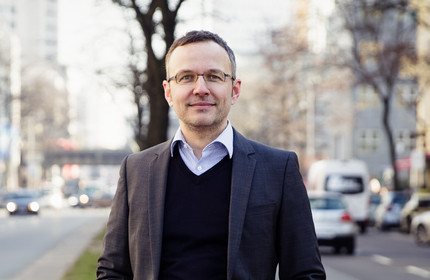
Initiator of the program
„This research-oriented Master program combines intensive training in quantitative methods with the acquisition of hands-on knowledge in economic policy analysis. Students also benefit from a range of courses that address current research in the field of economic policy.“
Prerequisites for Admission to the Master’s Program
The prerequisite for studying in a Master's program is generally a first professional qualification degree, e.g. a Bachelor's degree. Students should have acquired this first degree in Economics or in a related discipline. This degree must fulfill the following prerequisites: standard period of study of at least 6 semesters (comprising at least 180 credit points) at least 60 credit points in economics (including at least 18 credit points in statistics, econometrics and mathematics).
The program additionally requires proof of good proficiency in English corresponding at least to the B2 level of the Common European Framework of Reference for Languages.
You can read more about the subject-specific admission requirements in the Admission Regulations.
Program Structure
Students will earn a total of 120 credit points (CP) in four semesters:
- 1st sem.: Adv. Microeconomics, Adv. Macroeconomics, Adv. Microeconometrics (27 CP)
- 2nd sem.: Economic Policy (18 CP), Quantitative Methods (12 CP)
- 3rd sem.: Economic Policy (12 CP), Quantitative Methods (12 CP), Electives (6 CP)
- 4th sem.: Electives (12 CP), Master Thesis (21 CP)
Electives can be used to further specialize in Economic Policy/Quantitative Methods and/or for the internship/ internationalisation modules. See below for a summary of structure and potential topics. You can download an Overview of all Modulesand an Exemplary Course of Study.
Students who have successfully applied for the double degree program spend the 3rd and 4th semesters at the Université Rennes.
For additional information on specific modules, please see the module catalogue or consult the subject-specific Degree Regulations or the Departmental Advisory Office.
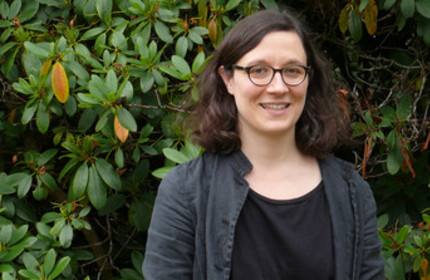
Professor of Economics
„We offer our students excellent conditions in small groups with intensive support. Our teaching is close to current research and relevant economic policy issues.“
Modules | Credit points |
|---|---|
A. Basis Courses | 27 CP |
| Advanced Microeconomics | 9 CP |
| Advanced Macroeconomics | 9 CP |
| Advanced Microeconometrics | 9 CP |
| B. Specialization Students must complete 54 CP of Specialization Modules. Students choose 30 CP of Economic Policy Modules and 24 CP of Quantitative Methods Modules. | 54 CP |
| B.1 Economic Policy Modules | 30 CP |
| Political Economics I/II: Methods / Applications | |
| Urban Economics I/II: Methods / Applications | |
| Growth and Distribution I/II: Theory / Applications & Empirics | |
| Seminar in Economic Policy | |
| Empirical Applications with the SOEP | |
| Advanced Economic Policy II: Theory / Applications | |
| Behavioral Economics | |
| Advanced Economic Policy I /II | |
| Gender Economics | |
| Environmental Policy | |
| Recent Topics in Economic Policy* I/II (e.g. Economics of Climate Change, Innovation and Productivity, Entrepreneurship and Econ. Development, Global Climate Governance, Modelling Political Decisions for Sustainability, Labour and Education Economics) | |
| *In the "Recent Topics in Economic Policy I / II" module, students can choose up to two courses (I / II) from regularly changing course offerings | |
| B.2 Quantitative Methods Modules | 24 CP |
| Policy Evaluation I/II: Methods** / Applications** **joint Master/Ph.D. course with the Berlin School of Economics (for further details see: BSoE) | |
| Econometric Methods and Applications** I / II (e.g. Machine Learning, Time Series Analysis, Panel Data Econometrics, Structural Models, Survival Analysis, Bayesian Methods, DIY: Research Idea Development, Data Visualization) | |
| Quantitative Methods** I / II (e.g. Experimental Methods, Quantitative Macroeconomics, Integrated Assessment of Climate Change, Data Science and Business Analytics, Coding for Economists, Systematic Review and Meta Analysis) | |
| Seminar in Applied Quantitative Methods | |
| Maschinelles Lernen I / II | |
| **In the modules "Econometric Methods and Applications I / II" and "Quantitative Methods I / II", students can choose up to two courses (I / II) from regularly changing course offerings | |
| C. Electives Students must complete modules of 18 CP. The modules can be selected from the following modules and the modules from area B. Specialization. Modules that have already been completed cannot be re-occupied. A maximum of 12 CP can be acquired through an internship. | 18 CP |
| Advanced Economic Studies I/II/III | |
| Internship I/II/III | |
| Internationalization Module | |
| D. Master’s Thesis and Research Colloquium | 21 CP |
| Research Colloquium | 3 CP |
| Master's Thesis | 18 CP |
| Total | 120 CP |
Advantages at a Glance
With its proximity to national institutions of economic policy making in Berlin and regional institutions in the state capital of Brandenburg, Potsdam is a perfect location to study economic policy issues. Students will profit from:
- the department’s excellent staff-to-student ratios
- a wide variety of courses that offer great possibilities to specialize in Economic Policy or Quantitative Methods, e.g. Climate Policy, Gender Economics or Machine Learning
- our close cooperation with leading research institutes (DIW, PIK, MCC) and the associated internship program
- the possibility to participate in selected Ph.D. classes of the Berlin School of Economics (BSoE)
- workshops and policy events of our Center for Economic Policy Analysis (CEPA)
- close interaction with faculty members and guests in the weekly research seminar (PRSE)
- international orientation and the possibility to study abroad (more information).
- the possibility receive a double degree in International Master in Public Policies from the University of Potsdam and the University of Rennes.
- proximity to the campus from Berlin, e.g. in 13 (23) minutes from Berlin Charlottenburg (Central Station) with the RE23.
A limited number of research assistant (RA) positions are available for talented students. Contract options range from six to 12 hours per week (monthly salary: 355 to 710 EUR).
The University of Potsdam takes into account the actual living conditions of its students and has introduced the possibility of part-time study for many degree programs. This also pertains to the Economic Policy and Quantitative Methods program. To learn more, and to find a list of subjects appropriate for Part-Time Study, please see part-time study at the University of Potsdam.
Application
Have you decided to study the English-language master’s degree in Economic Policy and Quantitative Methods (EPQM) at the University of Potsdam? Then you should take the next step on the application pages to find out more about current application and enrollment procedures.
Consultation & Contact
Prof. Dr. Marco Caliendo
Examining Board Director, Head of the Program and Student Advisor EPQM
E-mail: epqmuuni-potsdampde
Ricarda Stremlow
Study Organization & Examination Administration Economics
Phone: +49 331 977-3262
E-mail: econ-masteruuni-potsdampde
This description is based in part on information from the subject-specific regulations for a master’s degree in Economic Policy and Quantitative Methods at the University of Potsdam dated February 26, 2020 (AmBek No. 7/20, p. 279).

